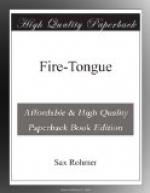The first thing that had struck Harley on entering the house had been an overpowering perfume of hyacinths. Now he saw whence it arose; for, conspicuous amid the wreaths and crosses, was an enormous device formed of hyacinths. Its proportions dwarfed those of all the others.
Mrs. Howett, the housekeeper, a sad-eyed little figure, appeared now from behind the bank of flowers. Her grief could not rob her of that Old World manner which was hers, and she saluted the visitors with a bow which promised to develop into a curtsey. Noting the direction of Phil Abingdon’s glance, which was set upon a card attached to the wreath of hyacinths: “It was the first to arrive, Miss Phil,” she said. “Isn’t it beautiful?”
“It’s wonderful,” said the girl, moving forward and drawing Harley along with her. She glanced from the card up to his face, which was set in a rather grim expression.
“Ormuz Khan has been so good,” she said. “He sent his secretary to see if he could be of any assistance yesterday, but I certainly had not expected this.”
Her eyes filled with tears again, and, because he thought they were tears of gratitude, Harley clenched his hand tightly so that the muscles of his forearm became taut to Phil Abingdon’s touch. She looked up at him, smiling pathetically: “Don’t you think it was awfully kind of him?” she asked.
“Very,” replied Harley.
A dry and sepulchral cough of approval came from Doctor McMurdoch; and Harley divined with joy that when the ordeal of the next day was over Phil Abingdon would have to face cross-examination by the conscientious Scotsman respecting this stranger whose attentions, if Orientally extravagant, were instinct with such generous sympathy.
For some reason the heavy perfume of the hyacinths affected him unpleasantly. All his old doubts and suspicions found a new life, so that his share in the conversation which presently arose became confined to a few laconic answers to direct questions.
He was angry, and his anger was more than half directed against himself, because he knew that he had no shadow of right to question this girl about her friendships or even to advise her. He determined, however, even at the cost of incurring a rebuke, to urge Doctor McMurdoch to employ all the influence he possessed to terminate an acquaintanceship which could not be otherwise than undesirable, if it was not actually dangerous.
When, presently, the party returned to the neighbouring house of the physician, however, Harley’s plans in this respect were destroyed by the action of Doctor McMurdoch, in whose composition tact was not a predominant factor. Almost before they were seated in the doctor’s drawing room he voiced his disapproval. “Phil,” he said, ignoring a silent appeal from his wife, “this is, mayhap, no time to speak of the matter, but I’m not glad to see the hyacinths.”
Phil Abingdon’s chin quivered rebelliously, and, to Harley’s dismay, it was upon him that she fixed her gaze in replying. “Perhaps you also disapprove of his excellency’s kindness?” she said, indignantly.




